- Home
- Mike Lupica
No Slam Dunk
No Slam Dunk Read online
ALSO BY #1 BESTSELLER MIKE LUPICA
Travel Team
Heat
Miracle on 49th Street
Summer Ball
The Big Field
Million-Dollar Throw
The Batboy
Hero
The Underdogs
True Legend
QB 1
Fantasy League
Fast Break
Last Man Out
Lone Stars
Philomel Books
an imprint of Penguin Random House LLC
375 Hudson Street
New York, NY 10014
Copyright © 2018 by Mike Lupica
Penguin supports copyright. Copyright fuels creativity, encourages diverse voices, promotes free speech, and creates a vibrant culture. Thank you for buying an authorized edition of this book and for complying with copyright laws by not reproducing, scanning, or distributing any part of it in any form without permission. You are supporting writers and allowing Penguin to continue to publish books for every reader.
Philomel Books is a registered trademark of Penguin Random House LLC.
Library of Congress Cataloging-in-Publication Data
Names: Lupica, Mike, author.
Title: No slam dunk / Mike Lupica.
Description: New York, NY : Philomel, 2018.
Summary: In Annapolis, Maryland, seventh-grader Wes is a good teammate but this basketball season has been challenging because of his ball hog teammate Dinero, who is determined to steal the spotlight, and Wes’s army veteran father, who is suffering from PTSD.
Identifiers: LCCN 2018006767 | ISBN 9780525514855 (hardback) | ISBN 9780525514862 (ebook)
Subjects: | CYAC: Basketball—Fiction. | Veterans—Fiction. | Post-traumatic stress disorder—Fiction. | Fathers—Fiction. | BISAC: JUVENILE FICTION / Sports & Recreation / Basketball. | JUVENILE FICTION / Social Issues / Friendship. | JUVENILE FICTION / Family / Parents.
Classification: LCC PZ7.L97914 No 2018 | DDC [Fic]—dc23
LC record available at https://lccn.loc.gov/2018006767
Edited by Michael Green.
Cover Art © 2018 by Adam Brown
Cover Design by Maria Fazio
This is a work of fiction. Names, characters, places, and incidents either are the product of the author’s imagination or are used fictitiously, and any resemblance to actual persons, living or dead, businesses, companies, events, or locales is entirely coincidental.
Version_1
This book is for Taylor McKelvy Lupica,
for whom the song remains the same.
She walked into the room and changed everything.
Contents
Also by #1 Bestseller Mike Lupica
Title Page
Copyright
Dedication
Chapter One
Chapter Two
Chapter Three
Chapter Four
Chapter Five
Chapter Six
Chapter Seven
Chapter Eight
Chapter Nine
Chapter Ten
Chapter Eleven
Chapter Twelve
Chapter Thirteen
Chapter Fourteen
Chapter Fifteen
Chapter Sixteen
Chapter Seventeen
Chapter Eighteen
Chapter Nineteen
Chapter Twenty
Chapter Twenty-one
Chapter Twenty-two
Chapter Twenty-three
Chapter Twenty-four
Chapter Twenty-five
Chapter Twenty-six
Chapter Twenty-seven
Chapter Twenty-eight
Chapter Twenty-nine
Chapter Thirty
Chapter Thirty-one
Chapter Thirty-two
Chapter Thirty-three
Chapter Thirty-four
Chapter Thirty-five
Chapter Thirty-six
Chapter Thirty-seven
Chapter Thirty-eight
Chapter Thirty-nine
Chapter Forty
Chapter Forty-one
Chapter Forty-two
Chapter Forty-three
Chapter Forty-four
Chapter Forty-five
Chapter Forty-six
About the Author
ONE
EVERYBODY ALWAYS SAYS THERE’S ONLY one ball in basketball.
Now one had just hit Wes in the side of the face, making him feel like somebody had slapped him.
Hard.
It was a basic three-on-two drill: Wes on the right wing; Emmanuel Pike over on the left; Dinero Rey, the one leading the break, in the middle. There were two defenders waiting for them as they crossed half-court, waiting for Dinero to make the first move, to decide whether to keep the ball or pass it.
It was less than an hour into the Annapolis Hawks’ first practice together. Wes was now Dinero’s teammate, a year after they’d been the stars of opposing teams in the sixth grade. As Dinero made his way down the court, Wes knew the defenders were expecting him to give it up.
They knew what Wes did: Dinero was even better passing a basketball than he was dribbling it with either hand or shooting it from the outside or driving it to the basket. There was a reason why he was called Dinero even though his real name was Danilo.
He was money.
He was the smallest kid on the court. But that didn’t matter. He was fast and smart and flashy, with a game as big as his smile. A lot of kids his age could shoot and handle and blow past you if you gave them an opening. But it was what he could do with the ball that set him apart, Wes knew, from other kids their age, not just in their town, Annapolis, but maybe northern Virginia, too, and from all the slick ballers in Washington, D.C. Even though Dinero was only twelve, you could look him up on YouTube and see for yourself.
Now the first pass Dinero threw his way, very first one, had hit Wes flush in the side of the face.
Wes knew it was nobody’s fault but his own.
“When you don’t pay attention,” his dad had always told him, “what you generally do is pay.”
Dinero Rey had basically told him the same thing before they started the drill. Be ready if you’re open, he’d said.
“I might not be looking at you,” Dinero said, “but you better be looking at me.”
Then he’d given him a quick high five and that smile.
“We’re gonna do big things, you and me,” Dinero said. “Just you watch.”
Then Wes hadn’t been watching, and the ball caught him right next to his ear, bouncing off his hard head and out of bounds. The drill came to a stop in that moment, even though the ball kept rolling.
Wes could feel the heat of where the ball caught him, could almost feel the impression of the ball, on a night when he was no different from everybody else on the court at the new Annapolis Rec Center, and wanted to make the best possible impression, on his teammates, on his coach, everybody.
With his pale skin, Wes knew his face had to be getting red, and not just because of the ball hitting him, but the humiliation he was feeling.
Dinero got to him first.
“Sorry, dude,” he said. “I thought for sure you were looking.”
He grinned, which only made Wes feel worse.
“My fault,” Wes said.
“You okay?” The grin was still there.
“Yes.”
No! Wes thought.
Anybody who’d ever seen Wes play, who’d seen the magic in his own game, always talked about what a great head for basketball he had.
Only he wasn’t supposed to use it like this.
Not on the first day of practice with the rest of the Annapolis Hawks, an elite team of seventh-graders that, in a year, would be playing in a new elite league. The other seventh-graders, the ones who hadn’t made the Hawks, would play in the same travel league in which they’d played last season. But the Hawks, they were moving on. And moving up.
There were other stars from last year’s teams. But the two biggest were Dinero and Wes: the point guard and small forward who played big. The two guys who were going to do big things together.
What had he been thinking about while the ball was busy finding his face?
His dad.
But mostly how he needed this team as much as he’d ever needed anything in his life.
TWO
THE DREAM FOR THEIR FAMILY had always been that they would move back to Annapolis, where Wes’s dad had graduated from the United States Naval Academy before he became a Navy SEAL.
And that is what they’d finally done, at the start of sixth grade for Wes Davies, as his dad was about to set off on one last mission with the SEALs, in Afghanistan.
Wes could still remember the day he and his mom had said good-bye to Lieutenant Michael Davies. To Wes, it wasn’t just like his dad was leaving. It was always more than that between them. His dad was his hero, his best friend, his first basketball coach, and still the one who had taught him the most. So much of what Wes already knew about the game, all the big stuff about teamwork and unselfishness and decision-making, he’d learned from his dad. Especially the part about making good decisions. Even at twelve, Wes knew that for a Navy SEAL, making good decisions could mean the difference between life and death.
Before he’d left to get on the plane that day, Wes said, “Weren’t you supposed to be done after your last tour?”
His dad put his arms around him. Wes had grown a lot between fifth and sixth grade, but he still felt like a little boy when his dad’s arms were around him.
“Turns out the job wasn’t done,” his dad said. “And you know what I always tell you about jobs.”
“They don’t finish themselves,” Wes said.
Wes waited for his mom to say that the job was never going to be finished in Afghanistan. But she didn’t. Wes had heard them go back and forth about Afghanistan, not arguing, just talking about it in the kitchen when they thought he was asleep upstairs, their voices getting loud sometimes. When Wes would get up in the morning, he’d say, “Were you and Dad fighting last night?” And she’d smile and tell him that they weren’t fighting, just not giving in.
There was none of that the day they said good-bye, his mom not wanting this particular good-bye to be any harder than it needed to be.
“I’ll be back before you know it,” Michael Davies said to Wes, his strong arms still holding him tight. “And when I do come back, for good, I expect you to be twice the ballplayer you are now.”
“I will be.”
“Promise?”
“Promise.”
Wes pulled away then, so he could look up at his dad, knowing there were tears in his eyes, but not caring.
“You just promise you’ll come home.”
“And I’ll be twice the dad I am now,” his dad had said.
But when his dad returned, he wasn’t. Not even close.
THREE
NO ONE WAS QUITE SURE when the seventh-grade travel team in Annapolis had become the most glamorous one, at least before you started playing high school ball.
But it always had been, even before the formation of the Tri-State League and the chance to compete out of the region and all the way to the National Travel Basketball Association tournament, in South Carolina.
So there was that on the line for the Annapolis Hawks, along with the chance go on to play AAU ball, which was the first giant step toward getting a college scholarship someday.
Wes knew AAU ball got you seen. It got you noticed. High school ball could do that, too. But Wes was still two years away from being a freshman, and AAU ball was next season. It was another reason why this season was so important.
Just not the only reason.
It was more than that with Wes, even though he’d never talked about why with his friends, or even his mom. And he told his mom almost everything.
“You know,” she said at the dinner, “I’m almost positive you said something on the way home from practice. But I must have missed it.”
“I was kind of bummed, is all.”
“Wow,” she said, “I didn’t pick up on that at all!”
He told her then about Dinero’s pass hitting him in the face and feeling like a complete idiot in front of the team.
It was only the two of them, as usual. His dad no longer even came over for dinner. Wes still didn’t understand why.
His mom slapped the table but was smiling at him as she did.
“Oh, the horror!” she said. “Well, that’s it, we’ll have to find you another sport. I forget, are you any good at skating? Of course, that would bring in the risk of getting hit in that adorable face by a puck.”
“I’m glad you think this is funny,” Wes said.
“You know I don’t,” she said. “And I would never make fun of you. But missing one pass doesn’t sound to me like the end of the world.”
“It wasn’t just the pass!” Wes said. Now he was the one with the loud voice at the kitchen table. “It was that I wasn’t paying attention.”
“And, knowing you, it won’t happen again,” she said. “How did you play after that?”
“Okay, I guess.”
“With you,” his mom said, “that generally means a lot better than just okay.”
They ate in silence for a few minutes. The quiet never seemed to bother either one of them. It was one more thing that he loved about her. She didn’t know as much about basketball as his dad did. Wes was pretty sure that his dad knew more about basketball than anybody not coaching a team in high school or college or the pros. But his mom tried. She understood his dreams about making it to the nationals in travel ball, about AAU and college ball someday. And maybe even dreams that took him beyond college. She just didn’t treat basketball like it was a matter of life and death.
When Wes looked up at her again, he said, “He’s even better than I thought he was.”
“Who?”
“Dinero.”
She smiled again. “I kind of love that he calls himself that,” she said.
“No kidding, Mom,” Wes said. “When he makes a really good pass or play, he even rubs his fingers together the way that guy Johnny Football used to.”
“And nobody thinks that’s just a tad egotistical?”
“I think they would with anybody else,” Wes said. “But somehow he even makes being egotistical look smooth.”
“That’s not you,” she said.
“And never gonna be me.”
“Do you get the feeling that the two of you are going to be a good team?” she said.
“We have to be,” Wes said. “Or the Hawks will never be the team I think we can be.”
“You know what your father always said,” she said. “The beauty of basketball is five guys, one ball.”
“Sometimes it’s just two guys,” Wes said, “having to figure it out. Curry and Durant did with the Warriors.”
“And Davies and Rey will with the Annapolis Hawks,” Christine Davies said.
There was another silence now, the longest yet, until Wes looked at he
r and said, “You think he might show up tonight?”
She slowly shook her head, the smile gone, almost as if it had never been there.
“Didn’t he say he might?” Wes said.
“Your father says a lot of things these days, at least when he’s around,” she said. “He came home wounded this time, just not in the way that people think of a wounded soldier. And to make the pain go away, he drinks. I know you know that. It’s another reason why we’re apart right now.”
“It’s because he’s hurting so bad.”
“We all are.”
“It’s like we only see the damage,” Wes said. “But dad has to live with it.”
“I know,” his mom said. “I know.”
She asked if he would like some dessert; she’d bought his favorite: salted caramel ice cream. Wes said maybe later.
For now, they both knew where he was going.
Out to the basket his father had put up in the driveway, a driveway he’d expanded himself to give Wes more room to move around and work on his game. A driveway that had once been their place and now was just Wes’s.
“I used to think it was some kind of joke when people would talk about kids who eat and sleep basketball,” his mom said. “Not with you. You don’t need ice cream. You’re having basketball for dessert.”
He managed a small smile now, even though it took some work. He was still feeling the sting of that pass.
FOUR
IT WASN’T THE SAME WITHOUT him.
None of it was.
It was still basketball. Wes could even appreciate the peace he felt, just him and the ball and the hoop, out here alone in the night, in a splash of light from the floodlight his dad had installed at the highest point of the garage.
Somehow the sounds were almost sweeter when he was out here. Sound of the ball on the dribble. Sound of the ball hitting the net. Even what the announcers called the “kiss” of the ball off the backboard when he’d bank one in.
The only sound that was missing was the sound of his dad’s voice.
“You’ve got to finish, Wesley Davies. Finish the pass. Finish the drive. Finish the shot. Finish the job.”

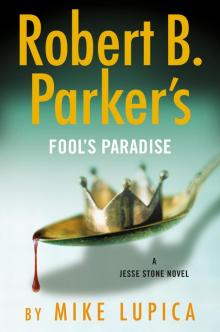 Fool's Paradise
Fool's Paradise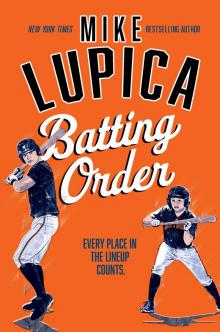 Batting Order
Batting Order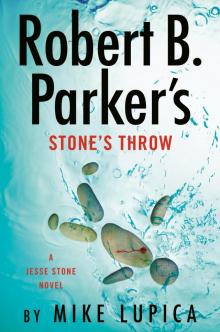 Stone's Throw
Stone's Throw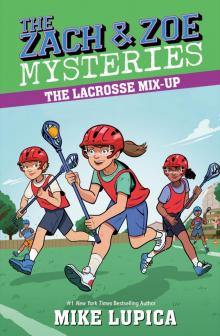 The Lacrosse Mix-Up
The Lacrosse Mix-Up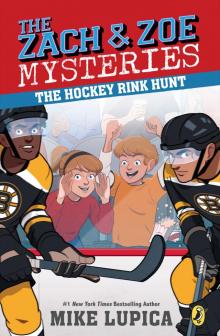 The Hockey Rink Hunt
The Hockey Rink Hunt Payback
Payback Triple Threat
Triple Threat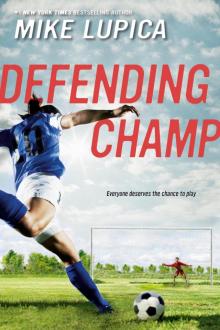 Defending Champ
Defending Champ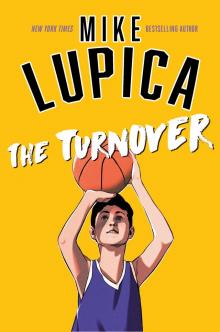 The Turnover
The Turnover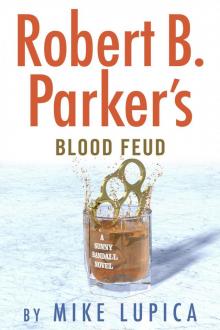 Robert B. Parker's Blood Feud
Robert B. Parker's Blood Feud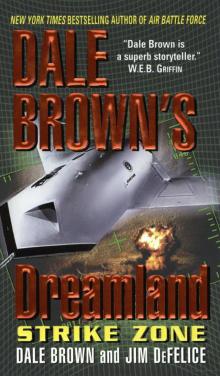 Strike Zone
Strike Zone Hero
Hero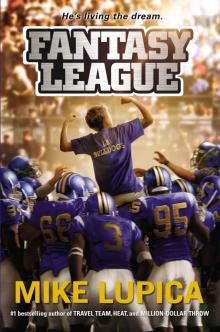 Fantasy League
Fantasy League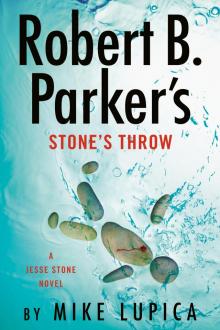 Robert B. Parker's Stone's Throw
Robert B. Parker's Stone's Throw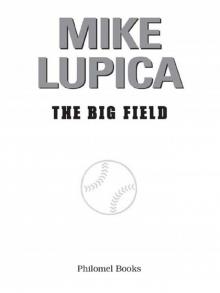 The Big Field
The Big Field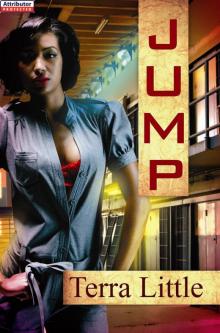 Jump
Jump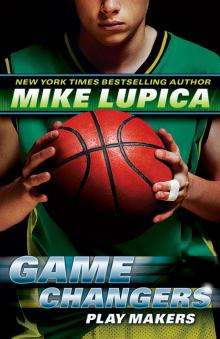 Play Makers
Play Makers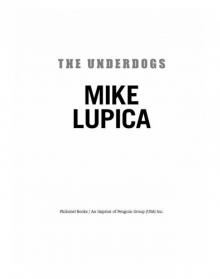 The Underdogs
The Underdogs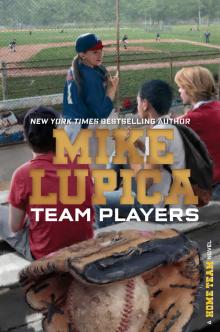 Team Players
Team Players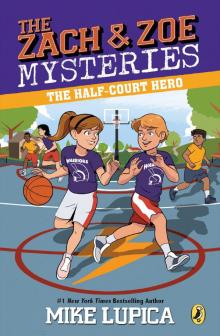 The Half-Court Hero
The Half-Court Hero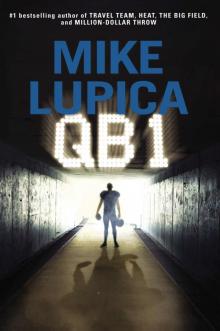 QB 1
QB 1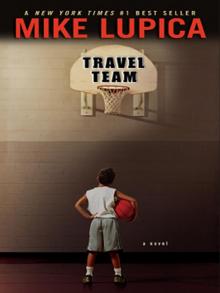 Travel Team
Travel Team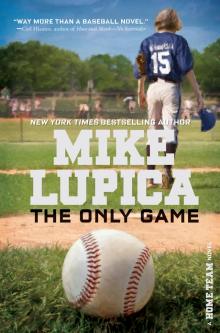 The Only Game
The Only Game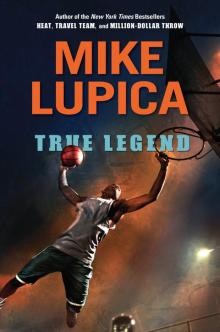 True Legend
True Legend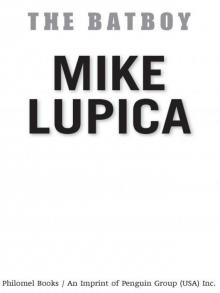 The Batboy
The Batboy Hot Hand
Hot Hand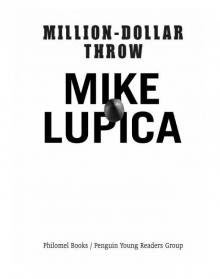 Million-Dollar Throw
Million-Dollar Throw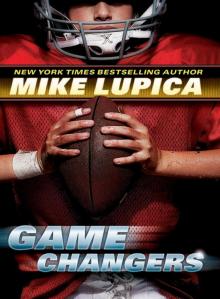 Game Changers
Game Changers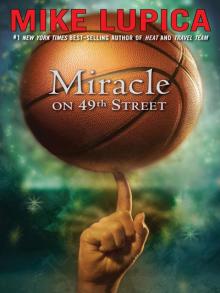 Miracle on 49th Street
Miracle on 49th Street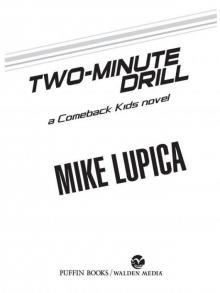 Two-Minute Drill
Two-Minute Drill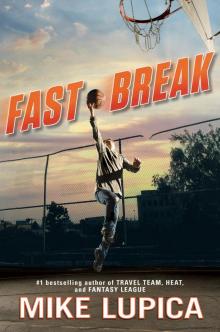 Fast Break
Fast Break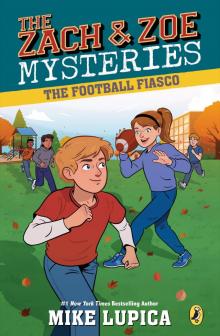 The Football Fiasco
The Football Fiasco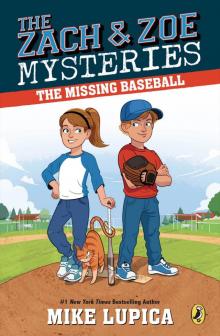 The Missing Baseball
The Missing Baseball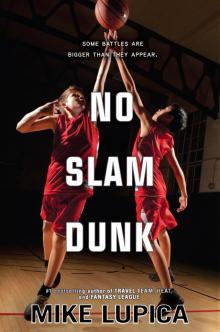 No Slam Dunk
No Slam Dunk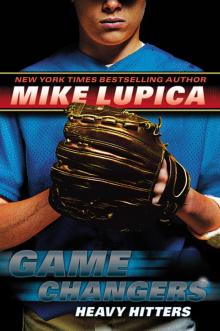 Heavy Hitters
Heavy Hitters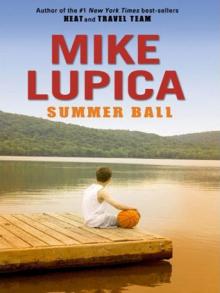 Summer Ball
Summer Ball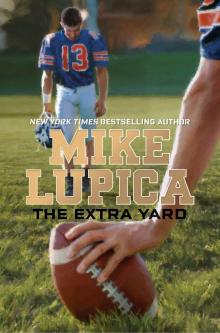 The Extra Yard
The Extra Yard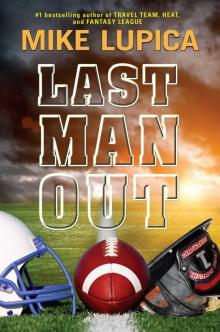 Last Man Out
Last Man Out